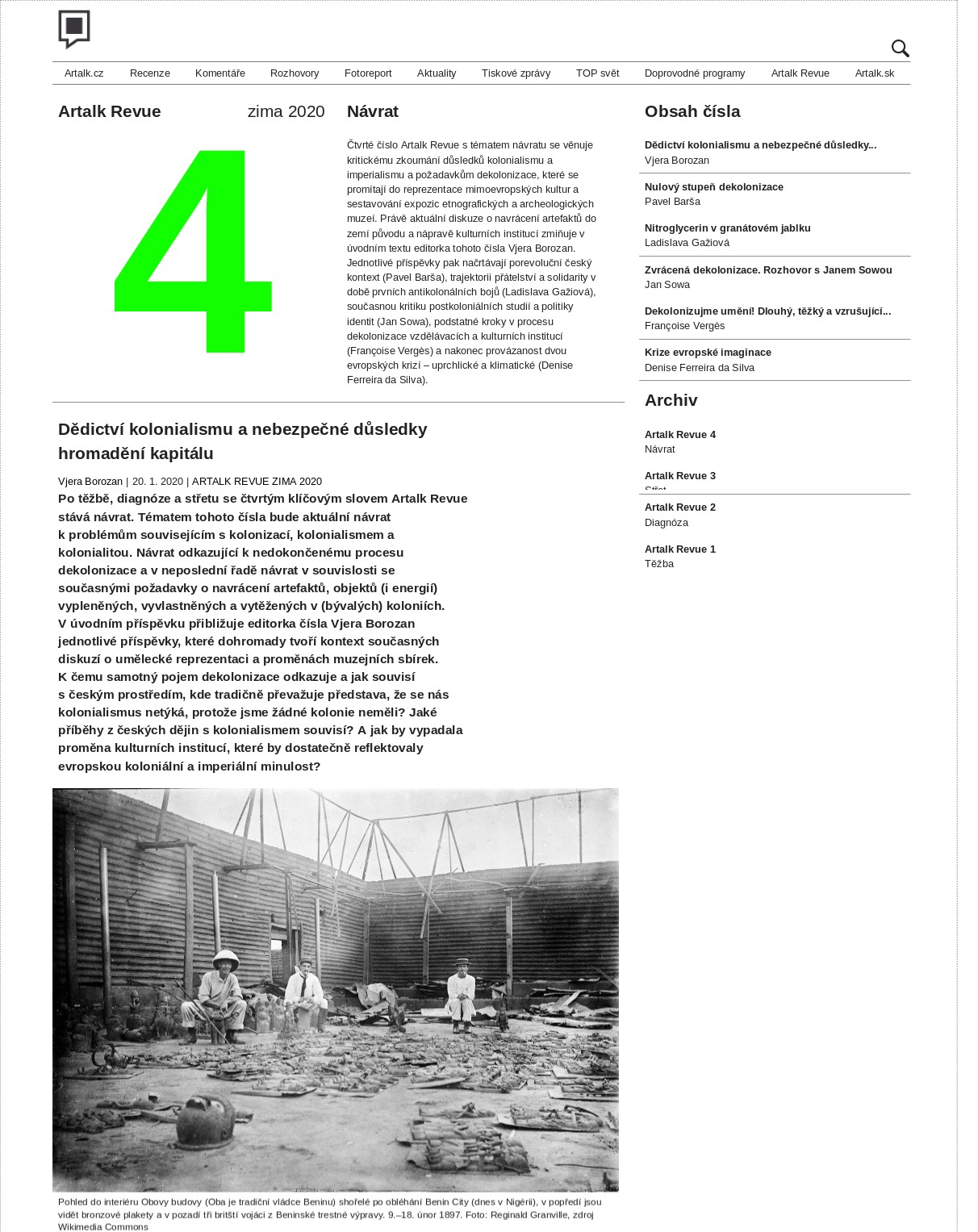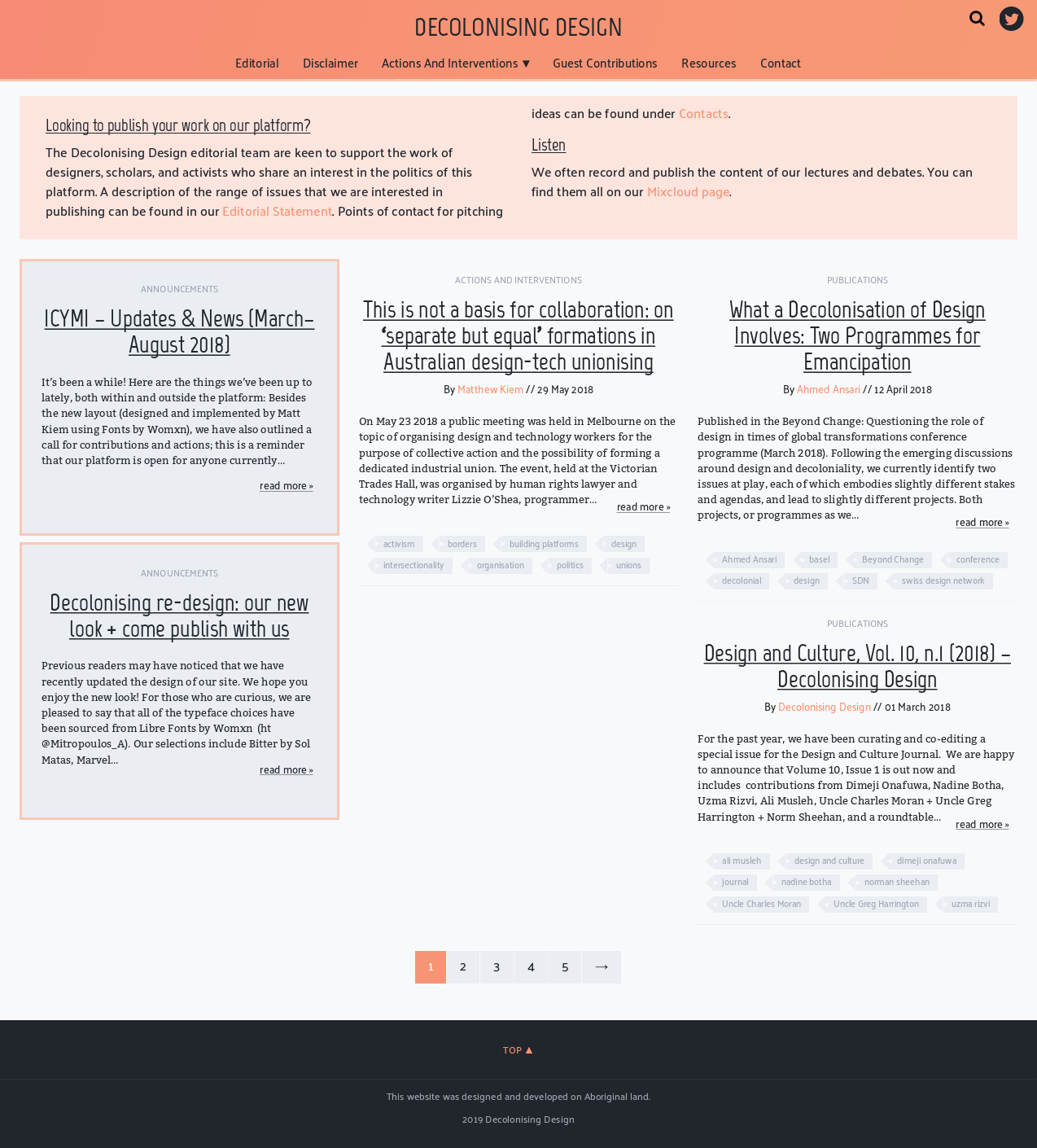Artalk Revue, 4: The Return (2020) [Czech/English]
Filed under magazine | Tags: · central europe, colonialism, decolonization, global south, imperialism, postcolonialism

“The fourth issue of Artalk Revue on the theme of return is devoted to a critical examination of the consequences of colonialism and imperialism and the requirements of decolonization that translate into the representation of non-European cultures and exhibitions in ethnographic and archaeological museums. In her editorial, Vjera Borozan takes on the discussions on the return of artifacts to the countries of origin and the situation in cultural institutions. The other contributors outline the post-revolutionary context in Visegrad countries (Pavel Barša), the trajectory of friendship and solidarity during anti-colonial struggles in the 19th century (Ladislava Gažiová), current criticism of post-colonial studies and identity politics (Jan Sowa), advances in the process of decolonization of educational and cultural institutions (Françoise Vergès), and finally the links between the refugee and climate crises (Denise Ferreira da Silva).”
Edited by Vjera Borozan
Publisher Artalk.cz, Brno, 2020
42 pages
HTML (Czech)
PDF (Czech)
PDF (English)
Ravi Sundaram: Pirate Modernity: Delhi’s Media Urbanism (2009)
Filed under book | Tags: · city, delhi, globalisation, infrastructure, mass media, modernism, modernity, piracy, postcolonialism, urban planning, urban studies, urbanism

“Using Delhi’s contemporary history as a site for reflection, Pirate Modernity moves from a detailed discussion of the technocratic design of the city by US planners in the 1950s, to the massive expansions after 1977, culminating in the urban crisis of the 1990s.
As a practice, pirate modernity is an illicit form of urban globalization. Poorer urban populations increasingly inhabit non-legal spheres: unauthorized neighborhoods, squatter camps and bypass legal technological infrastructures (media, electricity). This pirate culture produces a significant enabling resource for subaltern populations unable to enter the legal city. Equally, this is an unstable world, bringing subaltern populations into the harsh glare of permanent technological visibility, and attacks by urban elites, courts and visceral media industries. The book examines contemporary Delhi from some of these sites: the unmaking of the citys modernist planning design, new technological urban networks that bypass states and corporations, and the tragic experience of the road accident terrifyingly enhanced by technological culture. Pirate Modernity moves between past and present, along with debates in Asia, Africa and Latin America on urbanism, media culture, and everyday life.
This pioneering book suggests cities have to be revisited afresh after proliferating media culture. Pirate Modernity boldly draws from urban and cultural theory to open a new agenda for a world after media urbanism.”
Publisher Routledge, Oxford & New York, 2009
Asia’s Transformations series
ISBN 9780415409667, 0415409667
xix+224 pages
HT Geraldine
Reviews: Diya Mehra (SAMAJ, 2011), Fei An Tjan (Masters of Media, 2010).
PDF (10 MB)
Comment (0)Decolonising Design (2016–)
Filed under online resource | Tags: · decolonization, design, gender, politics, postcolonialism, race

“Our objective—as design scholars and practitioners—is to transform the very terms of present day design studies and research. Designers can put to task their skills, techniques, and mentalities to designing futures aimed at advancing ecological, social, and technological conditions where multiple worlds and knowledges, involving both humans and nonhumans, can flourish in mutually enhancing ways. For us, decolonisation is not simply one more option or approach among others within design discourse. Rather, it is a fundamental imperative to which all design endeavors must be oriented.
It is with the aim of providing an outlet for voices from the fringes, the voices of the marginal and the suppressed in design discourse, that we have opened this platform. We welcome all of those who work silently and surely on the edges and outskirts of the discipline to join and contribute to conversations that question and critique the politics of design practice today, where we can discuss strategies and tactics through which to engage with more mainstream discourse, and where we can collectively experiment with alternatives and reformulations of contemporary practice.” (from the Editorial)
Edited by Ahmed Ansari, Danah Abdulla, Ece Canli, Mahmoud Keshavarz, Matthew Kiem, Pedro Oliveira, Luiza Prado, Tristan Schultz, a.o.
HTML
A Manifesto for Decolonising Design (2019; Editorial, 2016/2017, HTML)
Design & Culture 10(1): Decolonizing Design (special issue of journal, 2018)

